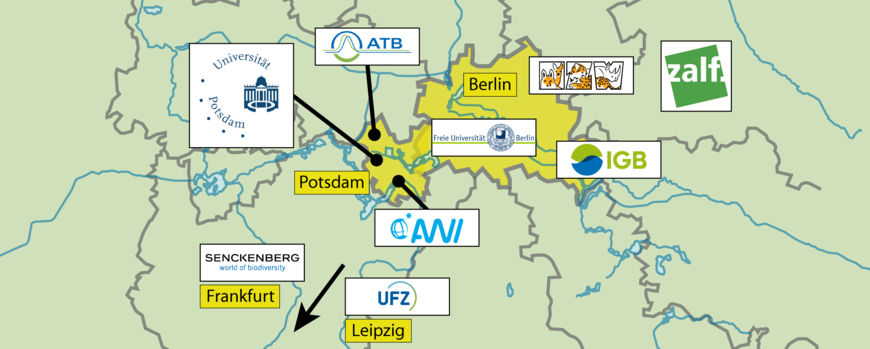Institutions
University of Potsdam
The University of Potsdam is the leading force of a unique research network with more than 20 extramural research institutes. The University of Potsdam has outstanding expertise in organismic biology with a clear focus on quantitative analyses. The flexible master's program Ecology, Evolution, and Conservation is research-orientated and offers excellent career options within and outside academia.
Freie Universität Berlin
The Freie Universität Berlin heads the Berlin- Brandenburg Institute of Advanced Biodiversity Research (BBIB), with many links to institutions engaged in biodiversity research in the capital area. The Institute of Biology, with a focus on terrestrial systems, sponsors a dedicated MSc and PhD program in Ecology, Evolution and Biodiversity.
Alfred Wegener Institute - Helmholtz-Centre for Polar- and Marine Research (AWI)
The Alfred Wegener Institute - Helmholtz-Centre for Polar and Marine Research (AWI) is primarily
active in the cold and temperate regions of the world. Together with numerous national and international partners, we are unravelling the complex processes at work in the “Earth System”. How will planet Earth evolve? Do the phenomena we’re observing represent short-term fluctuations or long-term trends? Polar and marine research has always been a fascinating scientific challenge; today it is also research into the future.
Helmholtz-Centre for Environmental Research (UFZ)
The Helmholtz-Centre for Environmental Research (UFZ) is one of the world’s leading research centres in the field of environmental research, enjoying high social recognition. It demonstrates ways in which a sustainable use of our natural resource base is possible for the benefit of both humankind and the environment. The UFZ supports the political arena, the economy and the general public to better understand the consequences of human actions on the environment and to develop options for social decision - making processes.
Leibniz-Institute for Agricultural Engineering and Bioeconomy (ATB)
The Leibniz-Institute for Agricultural Engineering and Bioeconomy is a pioneer of bioeconomy
research. We create the scientific foundation to transform agricultural, food, industrial, and energy
systems into a comprehensive bio-based circular economy. We develop and integrate techniques,
processes, and management strategies, effectively converging technologies to intelligently crosslink
highly diverse bioeconomic production systems and to control them in a knowledge-based, adaptive and
largely automated manner.
Leibniz-Centre for Agricultural Landscape Research (ZALF)
The Leibniz-Centre for Agricultural Landscape Research (ZALF) delivers solutions for an economically, environmentally and socially sustainable agriculture. Based on the analysis of complex landscape data, unique experimental methods, technologies, models and socio-economic approaches, ZALF develops and designs cropping systems, management and governance schemes in their landscape contexts.
Leibniz-Institute of Freshwater Ecology and Inland Fisheries (IGB)
The Leibniz-Institute of Freshwater Ecology and Inland Fisheries (IGB) is the largest national and one of the leading international research institutes for freshwaters. IGB studies the structure and functioning of freshwater systems to understand and predict how these systems respond to environmental change. IGB brings together hydrologists, biogeochemists, physicists, microbiologists, ecologists, evolutionary and fish biologists.
Leibniz-Institute for Zoo- and Wildlife Research (IZW)
The Leibniz-Institute for Zoo- and Wildlife Research (IZW) aims to understand the adaptability of wildlife in the context of global change and to contribute to the conservation of viable wildlife populations. We combine expertise in biology and veterinary medicine to investigate the diversity of life histories, the mechanisms of evolutionary adaptations, and the interrelations of wildlife with their environment and people, in close dialogue with the public and stakeholders.
Senckenberg – Leibniz-Institute for Biodiversity and Earth System Research
Senckenberg – Leibniz-Institute for Biodiversity and Earth System Research is one of the largest international players in this field of science and holds the fifth largest natural history collections world-wide. One of its institutes is the Senckenberg German Entomological Institute in Müncheberg. This institute, funded in 1886, is the only institute in Germany exclusively dedicated to the research on insects. With its large and particularly type-rich insect collection, its entomological library of world-class standard and its modern laboratory facilities, an international stronghold in entomological research exists in eastern Brandenburg.

